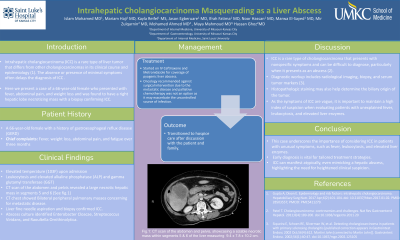Tuesday Poster Session
Category: Liver
P3933 - Intrahepatic Cholangiocarcinoma Masquerading as a Liver Abscess
Tuesday, October 24, 2023
10:30 AM - 4:00 PM PT
Location: Exhibit Hall

Has Audio

Islam Mohamed, MD
University of Missouri-Kansas City
Kansas City, MO
Presenting Author(s)
Islam Mohamed, MD1, Mariam Haji, MD2, Jason Egberuare, MD2, Kayla Reifel, MS1, Noor Hassan, MD1, Marwa Elsayed, MD1, Mir Zulqarnain, DO1, Mohamed Ahmed, MD1, Maya Mahmoud, MD3, Hassan Ghoz, MD1
1University of Missouri-Kansas City, Kansas City, MO; 2University of Missouri Kansas City, Kansas City, MO; 3Saint Louis University, St. Louis, MO
Introduction: Intrahepatic cholangiocarcinoma (ICC) is a rare type of liver tumor that differs from other cholangiocarcinomas in its clinical course and epidemiology. The presence of minimal symptoms often delays the diagnosis of ICC. Here we present a case of a 66-year-old female who presented with fever, abdominal pain, and weight loss and was found to have a right hepatic lobe necrotizing mass with a biopsy confirming ICC.
Case Description/Methods: A 66-year-old female with a medical history of GERD presented to the emergency department with fever, diffuse bony aches, abdominal pain, weight loss and generalized fatigue for the past 3 months.
Upon arriving at the emergency department, the patient had a fever of 103°F but was otherwise vitally stable. Laboratory work showed elevated white cell count, ALP and GGT. CT scan of the abdomen and pelvis revealed a large necrotic hepatic mass measuring 9.4 x 7.8 x 10.2 cm in segments 5 and 6. CT scan of the chest showed new bilateral peripheral pulmonary masses, indicating possible metastatic disease. The patient was started on Ceftriaxone and Metronidazole for coverage of pyogenic liver abscess. Ultrasound-guided abscess aspiration and biopsy were performed with drain placement. EGD showed gastritis and colonoscopy showed no occult masses. Abscess culture revealed growth of Enterobacter Cloacae, Streptococcus viridans, and Raoultella ornithinolytica. Liver biopsy revealed metastatic adenocarcinoma consistent with ICC. Immunostain for CK7 showed strong diffuse cytoplasmic positivity.
The Oncology team concluded that surgical intervention is not advisable due to the metastatic disease and palliative chemotherapy was deemed high risk in the setting of uncontrolled infection. After extensive goals of care discussion with the patient, she expressed her preference to transition to hospice care, and she was ultimately transferred to a hospice house.
Discussion: ICC is a rare type of cholangiocarcinoma that presents with nonspecific symptoms and can be difficult to diagnose, particularly when it presents as an abscess. Diagnostic workup includes radiological imaging, biopsy, and serum tumor markers. Histopathologic staining may also help determine the biliary origin of the tumor. As the symptoms of ICC are vague, it is important to maintain a high index of suspicion when evaluating patients with unexplained fever, leukocytosis, and elevated isolated alkaline phosphatase.

Disclosures:
Islam Mohamed, MD1, Mariam Haji, MD2, Jason Egberuare, MD2, Kayla Reifel, MS1, Noor Hassan, MD1, Marwa Elsayed, MD1, Mir Zulqarnain, DO1, Mohamed Ahmed, MD1, Maya Mahmoud, MD3, Hassan Ghoz, MD1. P3933 - Intrahepatic Cholangiocarcinoma Masquerading as a Liver Abscess, ACG 2023 Annual Scientific Meeting Abstracts. Vancouver, BC, Canada: American College of Gastroenterology.
1University of Missouri-Kansas City, Kansas City, MO; 2University of Missouri Kansas City, Kansas City, MO; 3Saint Louis University, St. Louis, MO
Introduction: Intrahepatic cholangiocarcinoma (ICC) is a rare type of liver tumor that differs from other cholangiocarcinomas in its clinical course and epidemiology. The presence of minimal symptoms often delays the diagnosis of ICC. Here we present a case of a 66-year-old female who presented with fever, abdominal pain, and weight loss and was found to have a right hepatic lobe necrotizing mass with a biopsy confirming ICC.
Case Description/Methods: A 66-year-old female with a medical history of GERD presented to the emergency department with fever, diffuse bony aches, abdominal pain, weight loss and generalized fatigue for the past 3 months.
Upon arriving at the emergency department, the patient had a fever of 103°F but was otherwise vitally stable. Laboratory work showed elevated white cell count, ALP and GGT. CT scan of the abdomen and pelvis revealed a large necrotic hepatic mass measuring 9.4 x 7.8 x 10.2 cm in segments 5 and 6. CT scan of the chest showed new bilateral peripheral pulmonary masses, indicating possible metastatic disease. The patient was started on Ceftriaxone and Metronidazole for coverage of pyogenic liver abscess. Ultrasound-guided abscess aspiration and biopsy were performed with drain placement. EGD showed gastritis and colonoscopy showed no occult masses. Abscess culture revealed growth of Enterobacter Cloacae, Streptococcus viridans, and Raoultella ornithinolytica. Liver biopsy revealed metastatic adenocarcinoma consistent with ICC. Immunostain for CK7 showed strong diffuse cytoplasmic positivity.
The Oncology team concluded that surgical intervention is not advisable due to the metastatic disease and palliative chemotherapy was deemed high risk in the setting of uncontrolled infection. After extensive goals of care discussion with the patient, she expressed her preference to transition to hospice care, and she was ultimately transferred to a hospice house.
Discussion: ICC is a rare type of cholangiocarcinoma that presents with nonspecific symptoms and can be difficult to diagnose, particularly when it presents as an abscess. Diagnostic workup includes radiological imaging, biopsy, and serum tumor markers. Histopathologic staining may also help determine the biliary origin of the tumor. As the symptoms of ICC are vague, it is important to maintain a high index of suspicion when evaluating patients with unexplained fever, leukocytosis, and elevated isolated alkaline phosphatase.

Figure: Figure 1 illustrates a computed tomography (CT) scan of the abdomen and pelvis showing a sizable necrotic mass within the liver. The dimensions of the mass are measured at 9.4 x 7.8 x 10.2 cm, occupying segments 5 and 6.
Disclosures:
Islam Mohamed indicated no relevant financial relationships.
Mariam Haji indicated no relevant financial relationships.
Jason Egberuare indicated no relevant financial relationships.
Kayla Reifel indicated no relevant financial relationships.
Noor Hassan indicated no relevant financial relationships.
Marwa Elsayed indicated no relevant financial relationships.
Mir Zulqarnain indicated no relevant financial relationships.
Mohamed Ahmed indicated no relevant financial relationships.
Maya Mahmoud indicated no relevant financial relationships.
Hassan Ghoz indicated no relevant financial relationships.
Islam Mohamed, MD1, Mariam Haji, MD2, Jason Egberuare, MD2, Kayla Reifel, MS1, Noor Hassan, MD1, Marwa Elsayed, MD1, Mir Zulqarnain, DO1, Mohamed Ahmed, MD1, Maya Mahmoud, MD3, Hassan Ghoz, MD1. P3933 - Intrahepatic Cholangiocarcinoma Masquerading as a Liver Abscess, ACG 2023 Annual Scientific Meeting Abstracts. Vancouver, BC, Canada: American College of Gastroenterology.
